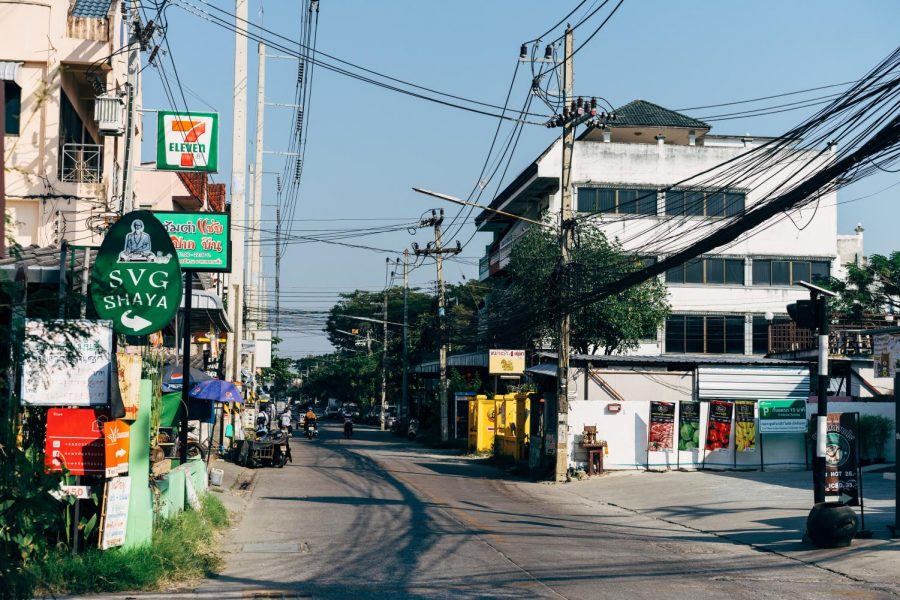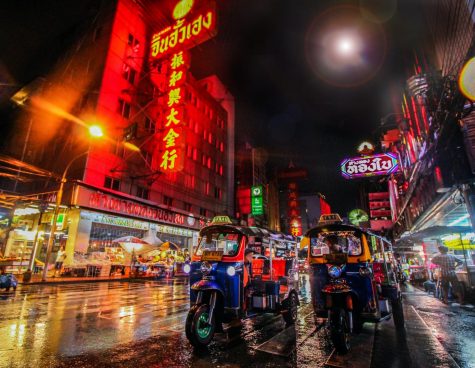Furor erupts over anti-sex trafficker Exodus Road
This is a multi-part series. Sign up here to be alerted when new stories are posted.
The red flags started for Allison Weber even before she started work with Exodus Road. At a supper in Thailand with the CEO, Matt Parker, and a few other couples, Parker suggested a tour of the red light district in the city of Pattaya, to show everyone how bad it was.
She had no interest in going. She’d visited go-go bars and brothels as part of her other job, which involved helping women in prostitution. It’s not pleasant. “It’s men groping women. It’s intense,” she said. She was surprised a man who ran a nonprofit fighting sex trafficking wanted to do this.
Parker pushed the men to go. He said something like: How small a man do you have to be to not go to these places? “My husband was really offended,” she said. “That felt out of line to me.”
Other incidents with the Colorado-based organization followed and she connected with others who’d had bad experiences over the past few years. In February, Weber joined two other former co-workers and at least eight others who have worked in the anti-sex trafficking and after care worlds in co-signing an “open letter” aimed at a laundry list of improprieties allegedly committed by Exodus Road between 2014 and 2020.
For this story, Global Observer interviewed more than 15 people, including former employees, others who worked in the anti-sex work field, and friends of the employees who confirmed details.
The complaints spanned a broad spectrum — two major complaints focus on questions about the organization’s overall effectiveness in the field and how it handled the alleged sexual assault of a staffer.
Other allegations include:
— the encouragement of sexualized behavior with women in bars and brothels as part of of going “undercover,”
— a number of instances among office workers of sexually inappropriate language,
— the demeaning treatment of staff,
— the size of the salaries paid to the two top employees, who are a married couple, and the methodology the organization uses to count the people it says it rescues.
“This is a really toxic organization and it’s harming the anti-trafficking sector as a whole,” said Weber, whose dinner with Parker was in 2014, and who had worked an another anti-sex-trafficking nonprofit for two years prior. “Their behavior is really damaging to that work.”
Kyle Fisk, a spokesman for Exodus Road, slammed the allegations as “baseless.” Exodus Road is helping drive systemic anti-trafficking change in Thailand, by making it more dangerous and less lucrative to be a sex trafficker, he said.
“There are certainly plenty of supporters and partners and donors that are engaged in the work of Exodus Road, who certainly believe that this organization is doing valuable and important work,” Fisk said. Exodus Road gets top ratings for fiscal transparency and accountability from GuideStar and Charity Navigator, two rating bureaus, Fisk noted.
Who does the work?
“Sex tourism” is big business in Thailand. Red light districts have thrived for decades, despite a recent Covid-19 slump and more muscular efforts by the government to rein them in.
Because of that reputation, Thailand has attracted more than 90 groups, especially from Western countries, that battle the sex trade by helping women and children. That makes for a chaotic, confusing landscape, with organizations scattered across Thailand, using different tactics and strategies. They are often competing for funds from the same sponsors.
The effectiveness of the organizations is anyone’s guess. The field lacks desperately needed standards, said multiple people. Basic questions, such as what defines success, are only slowly being addressed.
“The system is not broken — it’s just woefully incomplete and you can drive a bus through the holes,” said Duncan Jepson, managing director of Liberty Shared, which works to prevent human trafficking.
From the outside, it can be hard to distinguish the legitimate players from the pretenders. Some anti-trafficking groups have won hard-earned reputations from colleagues for helping people escape sex work and learn new professions. Others are labeled dismissively as “cowboys.”
One of those organizations facing criticism is Exodus Road.
What is Exodus Road?
From its founding in 2012 by the husband and wife team of Matt and Laura Parker, Exodus Road has grown quickly. It has offices in five countries: Thailand, India, the U.S., and more recently, Brazil, and the Philippines. Its stated mission is fighting human sex trafficking.
Exodus Road has been a fundraising success — it took in $2.1 million in grants and contributions in 2019, the most recent year available. But the salaries paid to the Parkers, and released publicly, have come under scrutiny — about $148,000 for Matt, the CEO, and about $130,000 for his wife Laura, the president.
In contrast, another Thai nonprofit, A21, pays its two top officers similar salaries, $150,000 and $143,000, but is four times larger, with nearly $9 million in contributions and grants.
Celeste McGee, the executive director and founder of the anti-trafficking organization Dton Naam, which helps boys and transgender sex workers, pointed out that the Parkers together earned $23,000 a month.
“That feels staggeringly shocking,” said McGee. “Two people don’t need $23,000 a month,” even if they are living between Thailand and the U.S.
Exodus Road spokesman Fisk defended the salaries as appropriate. “Our executive compensation committee of the Board sets executive salaries based on a third party nonprofit study of fair compensation. Size of organization and scope of work are critical factors in determining executive salaries,” he said in a statement.
“While two of our executives, Matt and Laura, are married, both provide critical and unique functions to the organization and are treated as separate employees, as they should be,” Fisk added.
Ineffective strategy?
Critics say Exodus Road uses an investigative strategy called “search and rescue” that is not effective in the long term at helping people who have been sex trafficked or work in the sex world.
It works like this: Undercover operatives find evidence of the human trafficking of underage children or women held against their will. The evidence is turned over to police for a “rescue mission,” according to its website.
It’s a variant of what’s more commonly called “raid and rescue.” Whatever Exodus Road calls it, detractors say tactics such as these, which are used by some other organizations too, are generally ineffective and are falling out of favor.
Five years ago, these types of investigations were more common. But after criticism and research into the risks and benefits, people are speaking out and calling for higher professional standards. “That’s a big change now,” said Julia Macher, director of Freedom Collaborative at Liberty Shared.
But it’s still popular with the public. It’s even a movie plot. In “Taken,” actor Liam Neeson smashes down doors and shoots bad guys while rescuing his daughter, kidnapped by sex traffickers. The 2008 movie was box office gold and led to two sequels. The simple theme resonates — save the girl, with the help of brute force.
The movies “give people the impression that in order to do an intervention you need your own personal SWAT team to break people out,” said Annie Dieselberg, the founder and CEO of NightLight Bangkok, which specializes in aiding women who are prostitutes, especially foreigners.
That may be true in a tiny percent of the cases, but it’s definitely not the norm, she said. Most women in sex work range from older teens to their 40s, who feel that prostitution is their best or only option. They are there voluntarily. Are there some women and children kept in locked rooms? Yes, but they are rare.
The problem with raid and rescue is that without extensive aftercare to help sex workers learn new ways of living, with marketable job skills, most people “rescued” this way quickly return to sex work, said Dieselberg.
The aftercare groups work much differently. No doors get busted down. Often, a woman in the sex trade calls an aftercare group and the group takes them away. That’s about it. “It is not a dramatic rescue,” Dieselberg said.
The lack of drama makes it a tough pitch for donors. It goes something like this: We need money to help a woman heal for several years, to rediscover her identity, to restore her relationship with her family, and to build goals and dreams.
It’s heartfelt, but not exciting. So funding often is simply not there, said Dieselberg, whose organization helps with long-term help, such as job training.
When asked about its aftercare programs, Fisk of Exodus Road said the organization uses social workers and crisis care workers. They are launching a safe house and transition home in Thailand for adult survivors, which will open in the late fall.
He declined to offer the names of any aftercare programs Exodus Road works with. “These baseless allegations against the Exodus Road certainly have the opportunity to be viewed negatively and we’re going to choose to protect our staff and partners from any of that negative publicity,” Fisk said.
Fisk made it clear the organization was not fighting common prostitution. “We fight human trafficking,” he said in an email. “Our teams are not looking for women and men who are in prostitution by choice, but rather those who cannot walk away from their situations due to ‘force, abduction, fraud, or coercion’ (which legally qualifies them as human trafficking victims).”
‘Volunteer’ investigators
A specific complaint against Exodus Road was its use of what it calls “volunteer operatives,” who work in two-week stints alongside more senior investigators in “search and rescue” operations. Critics called it a voyeuristic practice that results in little or no worthwhile intelligence — but drives fundraising.
Exodus Road lays out the work in dramatic fashion: “If you want to be on the front lines fighting human trafficking, you can become a volunteer operative supporting our national teams…. Evidence is gathered, cases are delivered, rescues and arrests are empowered on the front lines.”
The practice earns scorn from those who feel it is unrealistic to bring in people for a handful of days and expect real investigations.
Carter Quinley, who spent a decade working for anti-trafficking organizations in southeast Asia, including Thai police, called it unprofessional.
“It feels like a game, where a bunch of boys want to play in a bar… The classic white saviors — ‘I’m going to save these damsels in distress,’” Quinley said. “It’s like surgeons doing heart surgery without going to medical school.”
The volunteers’ work was a sham, said Eric Shark, a former senior investigator with Exodus Road who has been sparring with the organization over this and other issues, many of them detailed in the open letter. (Exodus Road said Shark is “not a credible source of information.”)
Shark said the training for the volunteers was thin. Between 2015-2017, he said he worked with six to eight deployments, with four to eight volunteer investigators each time. Most were men, with backgrounds as pastors, police, and NGO workers.
None of their work led to any raids that he was aware of, he said.
He told CEO Parker to stop using the volunteers because many were liabilities. At least once he threatened a nearly out-of-control volunteer with dismissal. But Parker refused to stop. “He loved bringing people over because it helps raise money for the organization,” Shark said.
People pay $4,500 to be a volunteer, which includes airfare and expenses, according to the website. Volunteers must be at least 30 and pass a background test and psychological evaluation. A day of in-person evaluations and testing follows. About 30% of those who apply are accepted. They also claim there is training on how to collect evidence, operate gear, and conduct intelligence gathering, according to the site. Shark said most of that was on the job.
Exodus Road declined to talk specifics about its investigative work, citing security. “In regards to any matters pertaining to our front line investigative work or personnel issues and operational protocols are treated as confidential and we will not discuss those matters for the safety of our team and the privacy and dignity of our investigators, in-country staff, and the victims they serve,” wrote Fisk in an email.
Failed operation?
A Thai-American woman, who asked to remain anonymous because she now does similar work in the U.S., cited a trip to a red light district where a lead on a vulnerable woman was never followed up.
The woman, then 24, was asked to accompany Parker and pretend to be his girlfriend on an undercover trip to a bar in Pattaya. It was awkward because she worked in the office and was not trained to do undercover. The trip was supposed to be … what? Investigative? She wasn’t sure and said it was never explained.
In the bar, she spoke with a 16-year-old girl named Man, in a haunting conversation. The girl said she was supposed to sell her virginity. The employee was appalled. Man wasn’t scared, depressed or drugged, she said. “She was just kind of resigned that this is what my job is now.”
The woman, Parker and another investigator left, doing nothing to help Man. What are we going to do for her?, she asked. We can’t help every girl, she was told. And that was that.
“I thought we had information to help someone and we just walked away,” she said. There was no plan, no debriefing after, no follow through. What was the point? “I was very puzzled,” she said.
On another occasion, while serving as Parker’s interpreter for a group of lawmen, the woman had a side conversation in Thai with an attendee. That caught Parker’s attention, but not in a good way. He later told her she should not speak to the others, but should be a “submissive Thai girl.”
“I said, ‘What?’ I am a Thai girl, but also an American girl.” She found the remark deeply upsetting. Her then boyfriend, now husband, confirmed they spoke about both incidents.
Parker denied the comment was made, said Fisk: He “categorically denies ever making the alleged racial and sexist comment. This is completely out of character and is not consistent with what he would say or do. These claims are hurtful and untrue.”
Counting the victims
Exodus Road claims an impressive record of rescuing victims: “1,483 survivors rescued,” it posted on its website, along with “804 offenders arrested.”
But its numbers are not that transparent. It’s not clear how many people were rescued in which countries, what counts as a rescue, what was the breakdown of women or children rescued, and what were their circumstances.
Spokesman Fisk said the nonprofit only counts rescues when it has a “primary impact.” Its investigators work with police, who make the actual rescues and arrests, and it counts those rescues when Exodus Road is directly involved. All the cases are classified as human trafficking, he said.
Some expressed skepticism about the numbers, noting a lack of transparency is a common tactic in a field with few standards.
Lauren Pinkston, who has studied and written about faith-based, anti-trafficking organizations, said more transparency is needed by Exodus Road and many other nonprofits in the field before their numbers can be trusted. Many “rescued” women often end up back in the sex trade because they lack needed aftercare. How are those women counted? How much money, she wondered, would be spent rescuing the same women again?
Kelly Garrity and Mihiro Shimano contributed to this story.
Next: Be alerted when new stories in this series are posted — sign up here.

Matt Carroll is a journalism professor of the practice at Northeastern University. Previously he ran the Knight Foundation-funded Future of News initiative...







Annie Dieselberg • Jun 23, 2021 at 9:10 pm
I want to clarify that my comments were specifically directed to the effectiveness of raids and not intended to endorse accusations against Exodus Road.